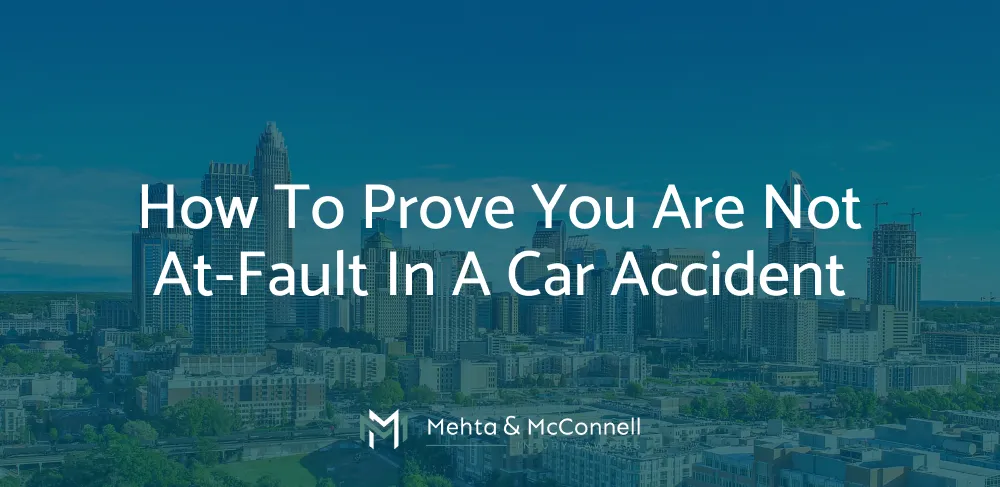 Car Accident
Car Accident
Even the safest drivers aren’t immune to incidents on the road. When another driver’s carelessness hurts you, it seems fair for them to be responsible for the costs of the damage they’ve caused. In many states, including North Carolina, the law requires just that.
Drivers who prove they’re not at fault in an incident on the road can recover financial compensation from the responsible party for their medical bills and vehicle repair. However, proving that someone else is to blame for an accident is trickier than it might appear.
In this blog post, we’ll explain what makes someone legally and financially responsible for a traffic incident in North Carolina. We’ll also discuss how to prove you are not at fault in a car accident and where to get help with disputes over who’s to blame for a crash.
What Does It Mean to Be at Fault in a Car Accident?
The at-fault driver in a car accident is the one who caused it. It’s easiest to recognize fault when a driver ignores the rules of the road, such as speeding, texting, or driving drunk. However, any driver who fails to exercise a reasonable standard of care on the road can be assigned fault.
North Carolina uses an at-fault system, holding the responsible driver financially liable for accident-related damages and injuries. Imagine you’re sitting at a stop light, and the car behind you rear-ends you because they’re speeding and can’t slow down quickly enough. If the other driver is at fault, they’re responsible for paying for the cost of the damage to your car and any medical bills for treating the whiplash you suffered from the accident.
However, if you share any fault in the incident, North Carolina law can ban you from recovering that money under the state’s contributory negligence rule. Under contributory negligence, no financial recovery is available for drivers who share 1% or more of the fault in an accident.
For example, suppose you were texting while sitting at the stop light in the previous scenario and didn’t see the light turn green. Even if the car behind you is speeding when they rear-end you, claimyou’re assigned 20% of the fault for being distracted. The result: you’re not eligible for compensation from the other driver.
North Carolina does not follow a no-fault insurance system. In no-fault states, insurance pays for medical bills regardless of who caused the accident.
How Is Fault Determined in a Car Accident in NC?
North Carolina uses a contributory negligence system to determine fault in car accidents. If a driver is even 1% at fault, they are barred from recovering any damages. This strict rule makes North Carolina one of the few states where minor fault eliminates compensation, regardless of the other driver’s greater negligence.
An insurance company usually assigns fault. When you file a claim with another driver’s insurer, they investigate the incident. An insurance adjuster reviews evidence from the scene, takes statements from drivers and witnesses, and determines who they believe is liable for the accident.
However, an insurer’s decision isn’t always the last word. Generally, an insurance company’s priority is to avoid paying out compensation for accidents. If an insurer disputes your claim or wrongly assigns you fault, you can challenge them. With the help of an attorney, you can take your case to court to have a judge or jury review the evidence and decide who’s at fault.
Proving Fault in North Carolina Car Accidents
Now, to the big question: How to prove you are not at fault in a car accident? The short answer is to show that someone else was at fault instead. Here are a couple of ways to build a case for another driver’s liability for a crash.
Gather Visual Evidence
Photos and videos from the accident scene can help establish who’s at fault. Take pictures of:
- Any vehicles involved, including damage,
- Road signs and traffic signals,
- Environmental and road conditions,
- Skid marks or debris, and
- Any obstacles to vision at the scene.
The best time to gather this evidence is right after the event. However, photos of the crash site and environment can still be valuable, even if taken days later.
Talk to Eyewitnesses
Speak to anyone who saw or heard the incident, including any passengers in the vehicles involved. Eyewitness testimony can shed light on valuable details leading up to the accident you might have missed. Testimony from people on the scene that you don’t know can be especially helpful. The observations of a neutral observer can do a lot to back up your account of the event.
Get the Police Report
If police officers were at the accident scene, they filed a report about the incident. The accident report can help confirm facts related to causation, like road conditions, weather, and location details. The report may also contain statements from witnesses and any tickets issued for violations of traffic laws. If the police report determines that another driver was at fault in the incident, that can help you make your case for compensation to an insurance company.
Consult with a Lawyer
The support of an attorney can make a big difference in proving fault after a car accident. If you want to dispute an insurer’s assessment of fault, it’s essential to have a trained personal injury attorney conduct an independent investigation into the cause of the accident.
A lawyer can communicate with an insurance adjuster on your behalf and help you avoid common pitfalls that can reduce the value of your claim. A personal injury attorney can also represent you and advocate for your right to compensation in court if you decide to take legal action.
Be aware that the statute of limitations for recovering legal compensation after an accident is only three years after the date of your injury. If you’ve been fighting an insurer over accident liability, contact an attorney as soon as possible for a case evaluation.
Take Action to Protect Yourself
Unfortunately, in the aftermath of an accident, it’s only too easy for victims to be saddled with blame they don’t deserve by insurers and irresponsible drivers. Because of North Carolina’s strict liability laws, even minor faults can have a high financial and personal cost.
At Mehta & McConnell, PLLC, we understand that navigating insurance claims, medical and repair bills, and your legal rights can be overwhelming. If you’re grappling with the cost of a car accident, call our office for a free consultation with a car accident lawyer in Charlotte.
Our attorneys have over three decades of combined experience helping victims get the compensation they deserve after an accident. We can help you identify and collect valuable, easily overlooked evidence, like cell phone records and traffic camera footage. Our team can also handle the time-consuming work of contacting and interviewing witnesses while you focus on recovery.


